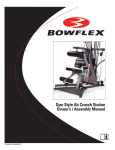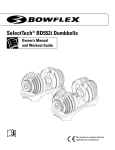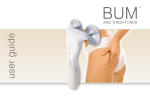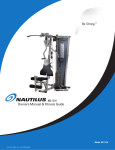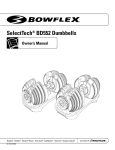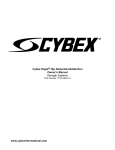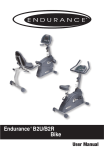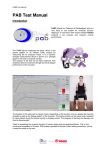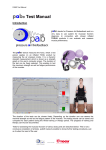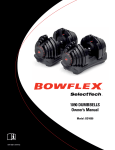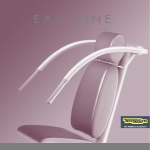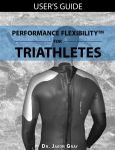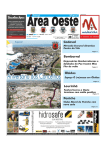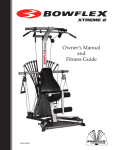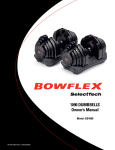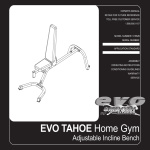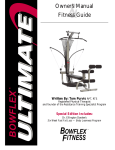Download Nautilus NT-1150 User's Manual
Transcript
Nautilus® NT-1150 & 1160 VKR Strength System Owner’s Manual & Fitness Handbook 1886 Prairie Way / Louisville, Colorado 80027 1.800.864.1270 / www.nautilus.com ©2004, Nautilus Inc. All Rights Reserved. Nautilus is a registered trademark of Nautilus, Inc. WARNING! Before beginning any exercise program consult your physician or health care professional. Only he or she can determine the exercise program that is appropriate for your particular age and condition. If you experience any lightheadedness, dizziness, or shortness of breath while exercising, stop the exercise and consult your physician. For Your Safety Please Follow These Instructions • It is your responsibility to read and understand all warnings and instructions contained in the Owner’s Manual. This is essential to safe operation. • Keep your body weight centered on the machine or bench while exercising. • Never allow children on the machine. Teenagers should always have parental supervision when using this machine. • Before exercising, make sure the spring lock seat pin is securely fastened and the bench is firmly in place. • Inspect your machine before each workout. Periodically check all fasteners to make sure none have loosened with use. Tighten if necessary. • Never attempt to exercise with more resistance than you are physically able to handle. • For safety, it is recommended that you exercise with a training partner or spotter. The following safety instructions apply only to Nautilus machines using weight stack resistance mechanisms: • Be certain that the weight pins are completely inserted prior to exercising. • Make sure the weight stack or top plate is never pinned in an elevated position. Do not use the machine if it is found in this position. Call your repair facility or consult your assembly guides if this occurs. • Inspect all cables, belts or chains and their connections prior to use. Do not use the machine if any component is found worn or damaged. • Never use dumbbells or any other means to incrementally increase the machine’s weight resistance, other than those means provided by Nautilus. Table of Contents Warranty Information ......................................... .1 Get to Know Your Machine ................................ 2 Machine Maintenance......................................... .3 Define Your Goals .............................................3-4 Exercises: Dip ......................................................................... 5 Vertical Knee Raise .............................................. 5 Pull Up .................................................................. 6 Warranty Information What Is Covered Nautilus warrants to the original purchaser of this Nautilus product that the equipment is free from defects in materials or workmanship, with the exceptions stated below. This warranty is not transferable or applicable to any person other than the original purchaser. • Use in any institutional or commercial settings such as health clubs, schools or recreation centers. Warranty The frame and welds of this product are warranted to the original purchaser for thirty (30) years from date of original purchase. Upholstery, pulleys, bushings and bearings are warranted for five (5) years to the original purchaser from the date of purchase. Cables and all other parts are warranted to the original purchaser for a period of one (1) year from the date of purchase. What We Will Repair During your Warranty Coverage Period, Nautilus will repair any Nautilus equipment that proves to be defective in materials or workmanship. In the event repair is not possible, Nautilus, at its option, will either replace your equipment or refund your purchase price, less shipping and handling. Warranties Do Not Cover • Damage due to use by persons who weigh more than 350 pounds. • Damage due to abuse, accident, failure to follow instructions or warnings in the Owner’s Manual, misuse, mishandling, accident or Acts of God (such as floods or power surges). Some states do not allow the exclusion or limitation of incidental or consequential damages, so the above limitation or exclusion may not apply to you. How To Obtain Service To obtain service for a Nautilus Fitness Product, contact an authorized Nautilus Fitness Retailer. You may also contact a Nautilus company representative at 800-864-1270 to help you locate a dealer in your area. How State Law Applies This warranty gives you specific legal rights. You may also have other rights which vary from state to state. • Consequential or incidental damage. 1 Get To Know Your Machine When you buy any exercise equipment you need stability, durability, and quality and you want long term results. But these alone are not enough: more than anything else, you need equipment that’s designed by the people who set the standards for ergonomic correctness and precision during exercise. At Nautilus, our expertise in the science of human performance goes into every piece of fitness equipment we offer. We design our machines to be stable, comfortable, easy to use, and to provide the body support you need to exercise with proper form, while avoiding injury. As a supplier of fitness equipment to health clubs worldwide, the Nautilus name has become synonymous with • Ultimate performance • Optimum results • Maximum durability. As you pursue your fitness goals, you can be sure that the same care, craftsmanship and rigorous standards that we put into our professional equipment, go into our full line of home gym equipment, too. Nautilus... Making the world stronger since 1970. The Nautilus® VKR Machine Maintenance Daily: After each use, wipe machine free of sweat with a clean, dry cloth. Upholstery can be cleaned with a mild detergent or spray cleaner. Define Your Goals Your body will do what you train it to do. That’s why it’s important to define your goals and focus them. Here are some fitness components that will help you define your goals and choose your fitness program. Muscle Strength is the maximum force that you can exert against resistance at one time. Your muscle strength comes into play when you pick up a heavy bag of groceries or lift a small child. It is developed when a localized muscle is worked both positively (concentric) and negatively (eccentric) at a resistance - great enough so you can perform only five to eight repetitions of the exercise before the muscle fails. Each set of repetitions is followed by a rest interval that typically runs three times longer than the set. Later, between exercise sessions, the muscle overcompensates for the stress and usually increases in both strength and size. Muscle Endurance is the ability to perform repeated contractions. It comes into play when you cross-country ski or work on your feet all day. Endurance training addresses the slow twitch, endurance muscle fibers, which depend on oxygen for energy. To develop muscle endurance, use low resistance and high repetitions - about 15-20 repetitions in each set, three sets to each exercise, working the muscle only to fatigue. Muscle Power is the combination of strength and speed of the muscular contraction. This is often misinterpreted as a) being directly associated with certain skill or sport and/or b) meaning that you must move fast. Load is actually a more important factor than speed when attempting to improve power. When training to achieve muscular power, pick a resistance that fatigues you in the 3-5 repetition range. When performing these reps, it is more important to think of contracting the muscles faster rather than attempting to move faster. Performing sport simulation exercises usually results in deterioration of the motor pattern or skill. The biomechanically sound method of improving power in your sport is to train for power using the correct joint movements, as described in this manual. Then practice the skill associated with your sport, learning to apply this newly achieved 2 Weekly: If used often, your machine should be thoroughly cleaned using a clean cloth and an ammonia based cleanser. Wipe machine down completely and be sure to touch up any scratches with touchup paint to prevent rusting. power. Body Composition is the ratio of fat weight (fat) to lean weight (muscles, bones and tissue). As you age, the ratio shifts. The fat weight increases and the lean weight decreases. Training for muscle strength will generally increase muscle size and aerobic conditioning will help burn extra calories. Performing these two forms of exercise, either at different times or together, will create the greatest changes in body fat weight. Balanced Strength and alignment are the result of equal strength developed in all parts of the body. It comes into play in your standing and sitting posture, and in your ability to perform just about any activity safely and effectively. An overdevelopment of the back will round the shoulders; weak or stretched abdominals can cause lower back pain. You want a balance of muscle strength in front and back. In addition, you need a balance of strength between your middle, lower, and upper body. Flexibility is the ability of a muscle or group of muscles to move the joint through a full range of motion. Flexibility comes into play when you execute an overhand serve or stretch for the top shelf in the kitchen. It is a cooperative movement of opposite muscle groups. When a muscle contracts, its opposite muscle group must relax for the action to occur. Increased flexibility means an increased range of motion, made possibly by this simultaneous contracting and relaxing. Good flexibility is important in protecting the body from injury and can be achieved through the balanced strength training programs that are included in this manual. Cardiovascular Endurance is the ability of the heart and lungs to supply oxygen and nutrients to exercising muscles over an extended period of time. It comes into play when you jog a mile or ride a bike. It is a critical component of overall fitness and health. 3 Define Your Goals Reaching Your Goals To reach your goals, follow a consistent, welldesigned program that provides balanced development to all parts of the body and includes both aerobic and strength exercise. Only then will you meet your goals safely and efficiently. The workout routines found in this manual are professionally designed and written to target specific fitness goals. Should you not find one specific program to your liking, you can design your own, based on sound information and the principles found in this manual. Remember your cardiovascular component: Any fitness program must contain a cardiovascular fitness component to be complete. So complement your resistance training with aerobic exercise such as walking, running, or bicycling. Design Your Own Program You may want to design your own personal program specifically geared to your goals and lifestyle. Designing a program is easy, as long as you follow the guidelines below. The variables are as follows: Understand fitness and its components: Improperly designed programs can be dangerous. Take some time to review this manual as well as other fitness guides. Know your current fitness level: Before you start any fitness program you should consult a physician who will help you determine your current abilities. Identify your goals: Goals are critical to choosing and designing an exercise program that fits and enhances your lifestyle, but so is strategy. It’s important not to rush the process and try to accomplish too much too soon. That will lead to setbacks and discouragement. Instead, set a series of smaller achievable goals. Select complementary exercises: Be sure to pair exercises that address compound joint movements and single joint movements. In addition, select exercises that address complimentary muscle groups. Training variables: When designing your own program there are several variables that, when mixed properly, will equal the right fitness formula for you. In order to find out the best formula, you must experiment with several combinations of variables. • Training Frequency: The number of times you train per week. We recommend daily activity but not daily training of the same muscle group. • Training Intensity: The amount of resistance used during your repetition. • Training Volume: The number of repetitions and sets performed. • Rest intervals: The time you rest between sets and the time you rest between workouts. Once you’ve established a base of fitness, follow these basic principles: • Isolate muscle groups: Focus work on specific muscle groups. • Progressive Loading: The gradual systematic increase of repetitions, resistance and exercise period. Nautilus® VKR Exercises Dip Elbow Extension with Shoulder Flexion Muscles Worked: Triceps, Anterioir Deltoids Start: • Face the machine, place your feet in the foot rests and grasp the handles using a neutral grip., thumbs positioned inward. • Extend your arms almost straight - elbows and wrists positioned directly in line with your shoulders. • Keep your knees bent comfortably - do not exceed a 90˚ angle. Success Tips: • Be very careful when lowering the body. Use control and watch your range of motion, taking care not to over-extend the shoulder or over-flex the elbow Action: • Slowly lower your body in a controlled motion. Allow your elbow to bend to nearly 90˚. • Keep your shoulders positioned over your hands. • Return to Start position by straightening your arms. Start Finish Vertical Knee Raise Hip Flexion with Knee Flexion Muscles Worked: Rectus Femorus, Iliacus, Psoas Major, Psoas Minor, Rectus Abdominus Success Tips: • Keep hip flexors and abs tight throughout motion. • Do not use momentum to throw your legs up into position. • Stabilize your chest and shoulders. Start: • Facing away from the equipment, put your feet on the support bar and your forearms on the pads. • Grasp the handles and stabilize your upper body. • Let your legs hang freely, so that your feet are not on the machine or on the ground. Action: • Slowly move your thighs upward to 90˚ of hip flexion. • While tightening with your abs, curl your spine slowly at the end of the motion. • Let the lower leg hang freely, using only your hip flexors and abs control the movement. • Slowly return to the Start position, keeping tension in the muscles. Start Put first things first: During each session, first work muscle groups that need the most training. Finish 4 5 Nautilus® VKR Exercises Pull Up Muscle Chart Shoulder Adduction with Elbow Flexion Muscles Worked: Triceps, Anterioir Deltoids Success Tips: • Keep tension in your muscles throughout this movement. • Keep your chest lifted and maintain a very slight arch in your lower back. • Keep knees bent, feet on footrest. Start: • Step onto the footrest and grasp the bar, palms facing forward, hands slightly wider than shoulder width. Action: • Pull your body upward by flexing your elbows, then drawing them tightly into your torso. • Slowly lower your body to the Start position, keeping movement tight and controlled and maintaining tension in your back and shoulders throughout the movement. Sternocleidomastoid Trapezius Pectoralis Major Start Anterior Deltoid Medial Deltoid Biceps Serratus Anterior Infraspinatus Rectus Abdominus Teres Major Brachialis Flexor Digitorum External Obliques Posterior Deltoid Superficials Triceps Latissimus Dorsi Brachioradialis Pronator Teres Finish Flexor Carpi Radialis Gluteus Medius Tensor Fasciae Latae Gluteus Maximus Iliopsoas Adductor Magnus Pectineus Rectus Femoris Vastus Lateralis Vastus Medialis Peroneus Longus Extensor Digitorum Longus Adductor Longus Iliotibial Tract Gracilis Biceps Femoris Semitendinosus Semimembranosus Sartorius Gastrocnemius Soleus Tibialis Anterior 6 7






